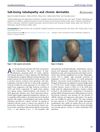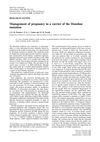 February 2025 in “Geriatrics and gerontology international/Geriatrics & gerontology international”
February 2025 in “Geriatrics and gerontology international/Geriatrics & gerontology international” Genetic testing is recommended for young patients showing signs like cataracts and hair changes to diagnose Werner syndrome early.

Genetic testing can help diagnose skin conditions but needs more research for full effectiveness.
 December 2022 in “Curēus”
December 2022 in “Curēus” Genetic testing confirmed a young girl has Atrichia with Papular Lesions due to mutations in the hairless gene.
 October 2014 in “Journal of Minimally Invasive Gynecology”
October 2014 in “Journal of Minimally Invasive Gynecology” Genetic testing for cancer risk can lead to early and life-saving treatments in people without symptoms.
 May 2008 in “Hair transplant forum international”
May 2008 in “Hair transplant forum international” A genetic test can identify people at risk of male pattern baldness early, allowing for quicker treatment.
 244 citations,
September 2008 in “Annual Review of Genomics and Human Genetics”
244 citations,
September 2008 in “Annual Review of Genomics and Human Genetics” The document concludes that the fast-growing direct-to-consumer genetic testing market lacks sufficient regulation, posing risks to consumers due to questionable test quality and accuracy.
April 2010 in “Dermatology Times”  26 citations,
July 2019 in “Dermatology and Therapy”
26 citations,
July 2019 in “Dermatology and Therapy” The conclusion is that genetic testing is important for diagnosing and treating various genetic hair disorders.
 11 citations,
November 2012 in “Seminars in Cutaneous Medicine and Surgery”
11 citations,
November 2012 in “Seminars in Cutaneous Medicine and Surgery” Genetic factors affect hair loss, and molecular testing may help predict, diagnose, and treat it.
 5 citations,
January 2017 in “Endocrinology”
5 citations,
January 2017 in “Endocrinology” Genetic defects in testosterone production can cause hormonal and developmental disorders, and more research is needed to understand androgen regulation and develop safer treatments.
 1 citations,
July 2014 in “Hormones”
1 citations,
July 2014 in “Hormones” Over a third of women thought to have non-classical congenital adrenal hyperplasia didn't have it confirmed by genetic tests.
6 citations,
December 2015 in “International journal of immunopathology and pharmacology” AE can have varied symptoms and genetic causes, but zinc therapy helps.
3 citations,
August 2021 in “Clinical Case Reports” Genetic testing is crucial before giving azathioprine to avoid severe side effects.
1 citations,
January 2015 in “The Journal of Dermatology” Genetic testing is crucial for diagnosing and managing non-Herlitz junctional epidermolysis bullosa.
 January 2025 in “Clinical Cosmetic and Investigational Dermatology”
January 2025 in “Clinical Cosmetic and Investigational Dermatology” Genetic testing is crucial for diagnosing rare hair loss disorders.
 November 2024 in “Rheumatology Advances in Practice”
November 2024 in “Rheumatology Advances in Practice” Monitor for early signs of azathioprine toxicity and check blood counts regularly.
 August 2024 in “The Journal of Urology”
August 2024 in “The Journal of Urology” The 2024 guideline updates recommendations for genetic testing, imaging, and sperm retrieval in male infertility.
 February 2023 in “Research Square (Research Square)”
February 2023 in “Research Square (Research Square)” Genetic testing confirmed a rare skin disorder in a young girl, which improved with zinc supplementation.
 December 2016 in “British Journal of Dermatology”
December 2016 in “British Journal of Dermatology” The meeting highlighted the importance of genetic testing and multidisciplinary approaches in pediatric dermatology.
 May 2014 in “Journal of The American Academy of Dermatology”
May 2014 in “Journal of The American Academy of Dermatology” The project aimed to understand how genetic test results affect patients' actions and feelings in dermatology.
 September 2023 in “International journal of science and healthcare research”
September 2023 in “International journal of science and healthcare research” Genetic testing is crucial for diagnosing congenital atrichia, a rare condition causing irreversible hair loss.
December 2021 in “Folia veterinaria” Over half of the dog skin disorders discussed have known gene variants, enabling genetic testing for diagnosis and responsible breeding.
 July 2018 in “Kidney international”
July 2018 in “Kidney international” Genetic testing for EGFR mutations is crucial in similar cases.
 March 2009 in “Prenatal Diagnosis”
March 2009 in “Prenatal Diagnosis” Pregnancies in a woman with the Donohue mutation were managed with genetic testing, resulting in three healthy infants.
 19 citations,
August 1999 in “European journal of endocrinology”
19 citations,
August 1999 in “European journal of endocrinology” The study concluded that testing hormone levels after stimulation is not reliable for identifying carriers of 21-hydroxylase deficiency; genetic testing is necessary.
 January 2024 in “Pediatric rheumatology online journal”
January 2024 in “Pediatric rheumatology online journal” Early genetic testing and JAK inhibitors can help treat systemic inflammation in SAVI patients.
12 citations,
March 2013 in “The American journal of dermatopathology/American journal of dermatopathology” Birt–Hogg–Dubé Syndrome requires genetic testing for accurate diagnosis due to its similarities with tuberous sclerosis.
 April 2020 in “Journal of the Endocrine Society”
April 2020 in “Journal of the Endocrine Society” Non-classic congenital adrenal hyperplasia (NCCAH) can mimic PCOS and requires genetic testing for proper diagnosis and treatment.
 October 2024 in “Journal of the Endocrine Society”
October 2024 in “Journal of the Endocrine Society” Ayme-Gripp Syndrome was confirmed in a woman through genetic testing, highlighting the need to consider rare genetic conditions in diagnoses.
 47 citations,
February 2015 in “European Journal of Clinical Investigation”
47 citations,
February 2015 in “European Journal of Clinical Investigation” The review suggests thorough evaluation and genetic testing for proper diagnosis and treatment of Chrousos syndrome.
























